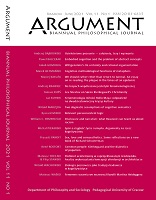Lev Shestov on Søren Kierkegaard’s Christianity
Lev Shestov on Søren Kierkegaard’s Christianity
Author(s): Tomasz KupśSubject(s): Christian Theology and Religion, Early Modern Philosophy, Existentialism, Philosophy of Religion
Published by: Wydawnictwo Uniwersytetu Komisji Edukacji Narodowej w Krakowie
Keywords: Lev Shestov; Søren Kierkegaard; Christianity; self-justification; modern philosophy; existentialism;
Summary/Abstract: Lev Shestov is one of the most moving readers of Søren Kierkegaard’s writings. Even if analyses of this Russian philosopher are rather self-analysis geared towards confirming preconceived theses than an unbiased insight into the letter of the Danish philosopher’s text, they are not devoid of value or inspiration. Above all, they are a testimony to Kierkegaard’s manifold influence on existential philosophy and an example of the ambiguity of the Danish thinker’s work. In this article I take into account the comments that appeared after the publication of the book Kierkegaard and existential philosophy (Emmenuel Lévinas, Nikolai Berdyaev) and the full chronology of Shestov’s publications on Kierkegaard, in particular the essay In the bull of Phalaris: the earliest fragment of the book Athens and Jerusalem. On this basis, I put forward a thesis about “Kierkegaard’s Christianity”, which Shestov understands as a system for the self-justification of his own life. The reconstruction of Shestov’s position is supplemented by the comments of authors of comparative studies on Kierkegaard vs. Shestov relations (James M. McLalchan, Joanna Nowotny, José R. Maia Neto).
Journal: ARGUMENT: Biannual Philosophical Journal
- Issue Year: XI/2021
- Issue No: 1
- Page Range: 193-206
- Page Count: 14
- Language: English

